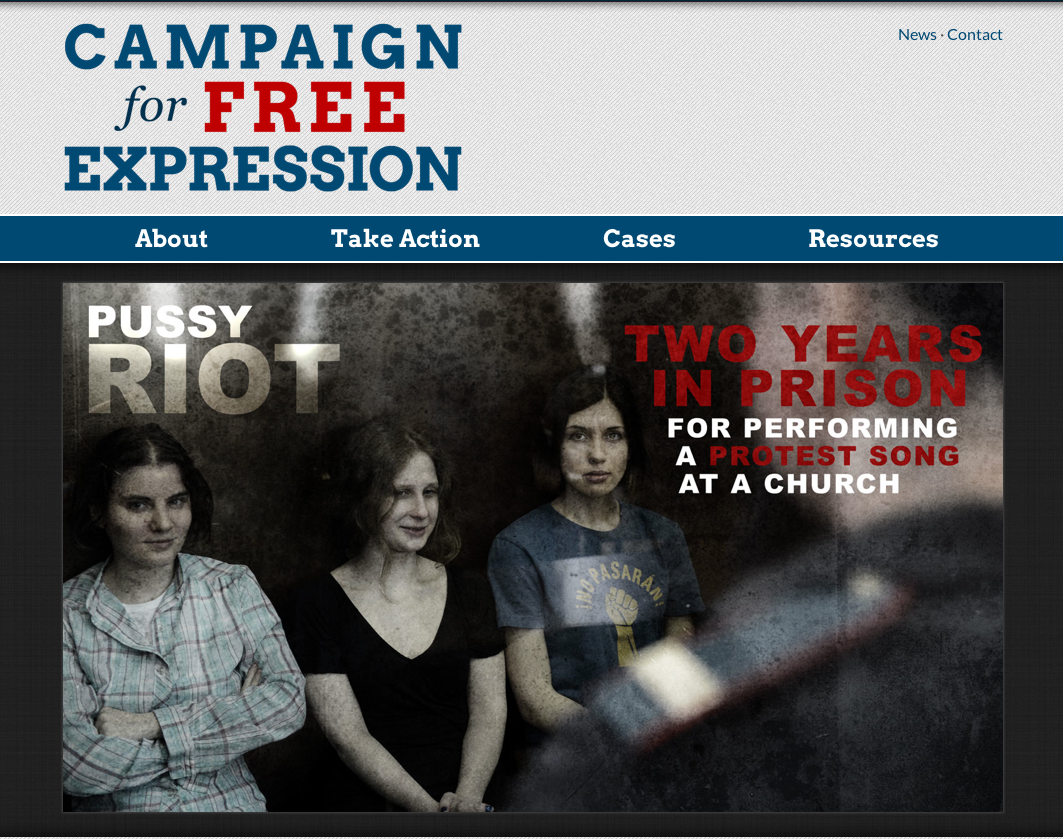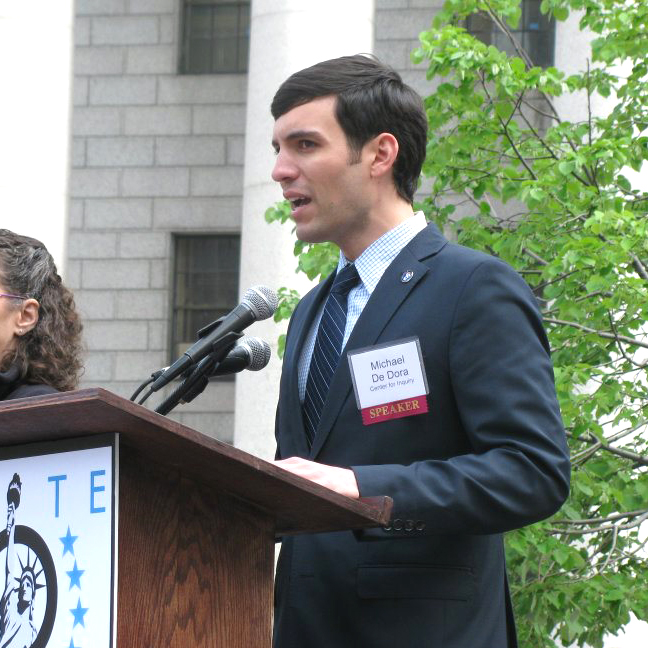How CFI’s Office of Public Policy is Kicking Ass and Coming for You Next.

I recently had a chance to sit down and ask Michael De Dora some questions about the work he does with CFI. You might remember Michael from my series on Speaking out Against Hate Directed at Women.
Michael is the Director of Public Policy and the UN Representative for the Center for Inquiry. Many people in the secular community seem unaware of the extremely important work that Michael De Dora and CFI are doing. They are literally on the front lines battling to protect women’s reproductive rights. They are working to ensure the separation of church and state here at home. They tirelessly rage against the oppressors of the world so that all people may eventually have freedom of religion, non religion and freedom of expression. They fight to keep religion out of the classroom and they fight to keep government funding from being funneled from public schools into religious schools. Care about freedom of speech? Then you should care about CFI’s newly launched Campaign for Free Expression.
What?
Not enough?
Too much social justice and not enough traditional skepticism for ya?
Well, guess what?
They even educate local government on the dangers of alternative medicine and fight to stop tax funding and insurance coverage of risky or unfounded treatments. Oh, and yeah, climate science is on their list too.
In fact, after finishing Michael’s interview, I am pretty convinced this guy never sleeps and is a superhero. So you better read what he has to say or he might be coming for you next.
My interview with Michael after the jump.
Could you please explain the mission of CFI’s Office of Public Policy and your active role in that policy?
The broad mission of CFI’s Office of Public Policy is to push governing bodies to enact public policies based on secular values, humanist ethical principles, and, where possible, scientific evidence. Essentially, we combine the secular and humanist worldviews, and the scientific worldview, and apply the combined perspective to policy debates. I think that this multi-faceted approach results in some very compelling arguments.
 But let me be more specific. Domestically speaking, we work with both Congressional lawmakers on legislative efforts, and the administration and its agencies on federal rules and regulations, to ensure separation of church and state and a respect for science. Internationally speaking, we work at the United Nations to pressure foreign leaders and diplomats to respect basic human rights such as freedom of belief and expression.
But let me be more specific. Domestically speaking, we work with both Congressional lawmakers on legislative efforts, and the administration and its agencies on federal rules and regulations, to ensure separation of church and state and a respect for science. Internationally speaking, we work at the United Nations to pressure foreign leaders and diplomats to respect basic human rights such as freedom of belief and expression.
We also sometimes lobby elected officials in states were CFI has branches – Indiana, New York, California, and Michigan – and in states where outrageous attempts are being undertaken, such as personhood amendments, fetal pain legislation, mandatory ultrasounds, and baseless restrictions on abortion providers. However, given our small pool of resources, we have to be careful about how thin we spread ourselves.
I’d say these efforts are evenly split between working alone and working with coalitions to enact change. Sometimes working alone is necessary or wise, but for the most part, the broader the coalition you can put together, the greater the chance of success. For example, we work with the Coalition Against Religious Discrimination to reform faith-based initiatives by the federal government; the National Coalition for Public Education to prevent taxpayer funding from being diverted from the public education system to private and religious schools; and the Coalition for Liberty and Justice to prevent public policy from imposing religious viewpoints on citizens. These coalitions include dozens of labor, civil rights, religious, secular, LGBT, and women’s organizations. And they’ve had a good deal of success in coordinating advocacy efforts and achieving common goals.
What is the focus of the work you have been doing recently?
Most recently our focus has been on protecting and defending the rights to freedom of religion, belief, and expression. Historically, these rights have been fragile, and they have come under widespread attack the last couple months – especially after the release of the Internet video Innocence of Muslims, which caused protests in the Middle East and Northern Africa.
One of our main focuses on this issue has been to shed light on the growing number of cases of people being punished simply for practicing a different, or no religion, or speaking their mind. Perhaps the most prominent case, at least for the secular community, is that of Alexander Aan, the Indonesian fellow who is in jail for posting on Facebook that he is an atheist.
In order bring attention to Aan and others like his, we just launched the Campaign for Free Expression, which seeks to rally broad support for the right to freedom of speech.  In concert with that, we have been working at the United Nations to fight attempts by the leaders of several countries to implement resolutions and agreements that would in effect restrict freedom of expression. And we have been working with the State Department to put diplomatic pressure on countries that do not respect freedom of expression. The idea is that the more social support you build for a position, the more feasible political action becomes.
In concert with that, we have been working at the United Nations to fight attempts by the leaders of several countries to implement resolutions and agreements that would in effect restrict freedom of expression. And we have been working with the State Department to put diplomatic pressure on countries that do not respect freedom of expression. The idea is that the more social support you build for a position, the more feasible political action becomes.
What are some issues that are currently a focus for your organization domestically?
Domestically, we have worked most intensely on three issues. One is reproductive rights. I don’t think I need to remind anyone that there have been record attacks on reproductive rights over the last 12 to 18 months, with lawmakers working to restrict access to both abortion and contraception. Most prominently, CFI has been lobbying the Department of Health and Human Services (HHS) and the Obama Administration since last August to keep in place the rule requiring health insurance providers and organizations providing health care plans to cover preventive health services, such as birth control and contraception, without charging a co-payment – and to reject lobbying efforts by the Catholic Bishops and other organized religious groups. We have also worked at the Congressional and state level to fight against any bill that would restrict a woman’s access to reproductive health care. In particular, we were active in opposing a bill that would have banned abortions in Washington, D.C. after 20 weeks, a violation of Roe v. Wade.
Another of our core issues is reforming the Office of Faith-Based and Neighborhood Partnerships, which was originally launched by President George W. Bush to provide religious groups taxpayer funding to perform social services. While President Obama has been better on this issue, instituting important reforms, religious organizations that receive taxpayer dollars are still allowed to discriminate in their hiring practices, and sometimes even in offering benefits to recipients. We think this is wrong, and have worked with the Coalition Against Religious Discrimination and its member groups to meet with policy makers in order to reform the program. We have also lobbied on specific pieces of legislation, such as the Workforce Investment Act and the Violence Against Women Act, that deal with federal grants and include or do not include language protecting taxpayers from supporting religious activities and discrimination.
A third issue of recent focus is school vouchers, in which the government diverts money from the public school system to parents for the purpose of sending their kids to schools operated by a religious organization. In fact, we just released a position paper on this very issue, authored by Ed Doerr. Doerr argues convincingly that implementation and expansion of voucher programs threatens the idea of religiously neutral, democratic public education, and could have profound, perhaps irreversible effects on our future. It would make that the public education system, which serves all citizens, would suffer while the government funnels money toward unregulated private religious schools that have shown to perform no better, and often worse than public schools. The position paper is more a product of our ongoing work on this issue than a signal that it has started. We have lobbied Congress to stop funding the D.C. voucher program, and worked at the state level, for instance in Indiana, to try to prevent voucher legislation from passing statehouses.
How do you go about informing the public and the government on issues that are important to the secular population?

As I’ve mentioned, CFI issues position papers, and shorter policy briefs, authored by experts in order to clarify our views on political questions. We publish these papers and briefs for two reasons. On one hand, we want policy makers to become more informed on issues before they take action and put policies in place. On the other hand, we want the public to become more informed on these issues as well – not just for the sake of knowledge, but because the more people who know about the severity and truth of an issue, the more they are willing to contact their elected officials and voice their concerns, and the more accurate they will be when they do so.
Another way in which we inform the public about political ongoings is through action alerts. When relevant votes are coming up in Congress or in a statehouse, we email our members with information on the vote and our position, and with a formatted message that, after filling out some personal details, can be sent quickly and directly to their elected officials.
Last but not least, we inform the public through media and public relations efforts. There are a lot of people who aren’t tuned into the world of policy and action alerts and, though I think more people should be, we realize that and try to reach them in other means. This includes everything from billboard advertisements to interviews with smaller and
